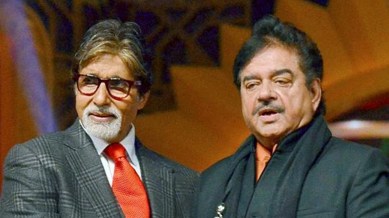📣 For more lifestyle news, click here to join our WhatsApp Channel and also follow us on Instagram
‘Kuch unki harqat, kuch meri’: What Shatrughan Sinha’s rift with Amitabh Bachchan reveals about ego, stardom, and the cost of silence in close relationships
The actor also recalled incidents from their working days -- from walking away from films to feeling excluded -- all because tensions between them had quietly simmered over the years.

Ego clashes, professional rivalries, and unresolved misunderstandings can deeply affect even the strongest of relationships — especially when success and fame are involved.
Veteran actor Shatrughan Sinha once opened up about his strained bond with Amitabh Bachchan, revealing how stardom and pride had played a role in driving a wedge between the two. In an interview with Aaj Tak, Sinha said, “Kuch unki harqat, kuch meri. Stardom and popularity can be intoxicating. Ya phir josh mein hosh kho dete hai.”
monthly limit of free stories.
with an Express account.
Although the two are now on good terms, Sinha admitted that time and maturity helped them come to terms with what had happened. He reflected, “Misunderstandings happen, and they sometimes grow. Then maturity sets in, and you realise it shouldn’t have happened. When it comes to Amitabh, I feel sorry, and I am sure he must have realised it too.”
The actor also recalled incidents from their working days — from walking away from films to feeling excluded — all because tensions between them had quietly simmered over the years. His story highlights how ego, silence, and pride can quietly erode meaningful connections if left unaddressed.
So, why do power and external validation often lead people to behave differently in close relationships?
According to Jai Arora, counselling psychologist and co-founder of Kirana Counselling, “External validation can distort self-perception. When a person is constantly praised, admired, or put on a pedestal, it activates the brain’s reward system, making them crave more of it — often at the cost of introspection or humility. This can become an echo-chamber of its own, reinforcing only what the person wants to believe and listen to, often their praise.”
In such dynamics, he adds that individuals may begin to prioritise public approval over private bonds. They might push away people who remind them of their roots, limits, or mistakes. Close friends or colleagues may become uncomfortable mirrors — showing truths that fame tries to erase. This isn’t always intentional; it’s a subtle shift, where ego builds walls and admiration replaces authentic connection.
What can cause someone to lose their sense of balance or perspective during intense emotional or professional phases?
Heightened emotions can hijack rational thought. “In high-stakes careers like acting, where one’s worth often feels tied to public reception, adrenaline and ambition can cloud judgment. The same applies during personal conflicts: anger, pride, or fear can flood the system, pushing logic aside,” notes Arora.
Such moments compromise the brain’s prefrontal cortex — the seat of thoughtful decision-making — and activate the amygdala, the emotional alarm bell. The expert adds that decisions made in this state often stem from impulse rather than clarity: abrupt fallouts, harsh words, or long-term resentment can follow. The impact? Missed opportunities for repair, years of silence, and irreparable damage to close relationships.
What does it take for people to reach this stage of emotional maturity and take accountability after years of unresolved tension?
Maturity is often born of time, reflection, and lived experience. “Emotional growth doesn’t always happen in real-time; it requires space away from the conflict, moments of regret, and a deeper understanding of oneself. This process is accelerated by loss,” states Arora.
He continues, “Lack of accountability can stem from the need to be right and have the last word. But over time individuals realise the emotional cost of unresolved tension and true responsibility, along with guilt for one’s actions, come to the surface.”
📣 For more lifestyle news, click here to join our WhatsApp Channel and also follow us on Instagram